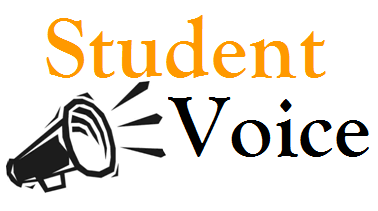This post is not about a special episode of teen singing sensations on The Voice. Hope you’re not disappointed! However, the show did come to mind when thinking about student voice. If you haven’t seen the show, essentially, it’s a contest for aspiring singers who must wow the judges and audience with their vocal abilities. The hope is that the judges will hit the buzzer and declare interest in mentoring the vocalist. The judges are experienced and very successful celebrities who have industry insights from which the contestants can greatly benefit, in theory.
Image credit: http://www.educationthroughleadership.com/giving-students-a-voice/
Much like our students, each contestant hopes to have his or her voice heard in order to learn, grow, and excel. The classroom may not be a ridiculously loud contest like what we see on The Voice, but it is a place where all learners should have the opportunity to direct their learning. Recent interactions with my own students have inspired me to reflect on voice and its implications in the classroom. In fact, it has only been in the past couple of months that I have really gotten out of my comfort zone and given students the microphone so as to make decisions about their own learning. It is my pleasure to share with you a few tips that are based on my personal experience.
Get informed.
Giving students a voice is not an exact science, especially since each classroom is unique. There are ways to prepare yourself for such a risk-taking endeavor, so I recommend that educators take some time to engage in discussion with others who have done it before putting learners on the stage. Read a blog on the topic, talk to on-site colleagues who have success with it, ask your PLN for ideas, and maybe engage in a Twitter chat. Then, ask yourself how your students might direct their own learning in your particular environment. You know your students best!
Tell stories.
Our learners need a little direction when we give them voice. In fact, all of us -- not just the learners in our classroom -- want to know how and why we’re doing what we’re doing. As educators, anecdotal stories can help as they have the potential to capture students’ attention and guide them to make meaningful recommendations. I tell my students that there are non-negotiable tasks that we must do in life, but we can suggest ways to tailor them to our needs.
My first anecdote this year was about the professional development sessions that our school faculty must attend every other Thursday. I told them that the PD is non-negotiable, but that teachers can make recommendations for future meetings. I explained that I shares my ideas with our administration in hopes that we will get to try something different. Then, I transitioned into an explanation of the non-negotiable part of the project that we are doing with students at other schools. We discussed some aspects that they could direct before I gave them a feedback form to complete. I found that the responses were more meaningful than they had been when I had made past attempts at seeking feedback, and I believe my anecdote and our discussion impacted the results.
Just as the contestants on The Voice are prepped before hitting the stage for their first performance, our learners also benefit from a little coaching. After all, don’t we want to make that empowering moment on the stage as successful as possible? Students might not have a voice in many of their classes, so make this time count!
Listen carefully and empower your learners.
Now that your learners have spoken, reflect on what they said. Sometimes you may receive several comments that are not helpful, but concentrate on the serious ones. Stay positive! Even if only one or two students provide you with meaningful feedback, do your best to make their voices heard. Most students are going to use the power of voice at some point, and that might be when they are making individual, rather than collective, decisions. At any rate, announce the changes that you are going to make as a result of student feedback. I recommend that you let them know repeatedly how much you appreciate it. In my own experience, learners are happy to hear, more than once, that their voice was heard and that it made a difference.
The fact is, there is more potential for buy-in when the learning is student-directed. Let’s let our learners shine with the mic in hand!
I would like to thank Eric Sheninger (@NMHS_Principal) for inspiring and inviting me to contribute to his blog. It was my first time doing so! He wrote a fantastic post on the need for educators to tell their classroom stories, and it inspired me to ask him about guest blogging. As a result, I wrote this post AND already invited one of my own students and colleagues to guest blog. Yet another example of the power of my PLN!
Check out Eric’s post HERE.
Thank you, Eric, for giving me a voice!

No comments:
Post a Comment